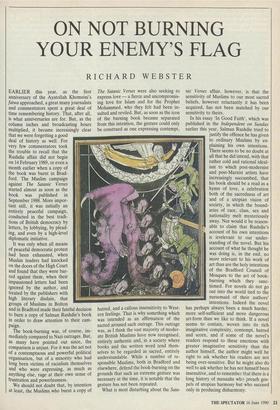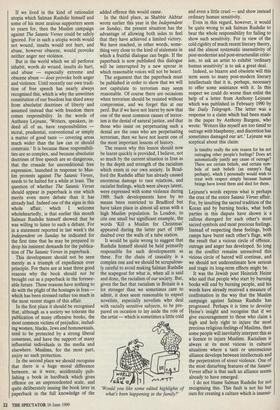ON NOT BURNING YOUR ENEMY'S FLAG
RICHARD WEBSTER
EARLIER this year, as the first anniversary of the Ayatollah Khomeini's fatwa approached, a great many journalists and commentators spent a great deal of time remembering history. That, after all, is what anniversaries are for. But, as the column inches and broadcasting hours multiplied, it became increasingly clear that we were forgetting a good deal of history as well. For very few commentators took the trouble to recall that the Rushdie affair did not begin on 14 February 1989, or even a month earlier when a copy of the book was burnt in Brad- ford. The Muslim campaign against The Satanic Verses started almost as soon as the book was published in September 1988. More impor- tant still, it was initially an entirely peaceful campaign, conducted in the best tradi- tions of British democracy by letters, by lobbying, by plead- ing, and even by a high-level diplomatic initiative.
It was only when all means of peaceful democratic protest had been exhausted, when Muslim leaders had knocked on the doors of the High Court and found that they were bar- red against them, when their impassioned letters had been ignored by the author, and treated by the publishers with high literary disdain, that groups of Muslims in Bolton and in Bradford made their fateful decision to burn a copy of Salman Rushdie's book in order to draw attention to their cam- paign.
The book-burning was, of course, im- mediately compared to Nazi outrages. But, as many have pointed out since, the comparison is unjust. For it was the act not of a contemptuous and powerful political organisation, but of a minority who had long been victims of racialism themselves and who were expressing, as much as anything else, rage at their own sense of frustration and powerlessness. We should not doubt that, by intention at least, the Muslims, who burnt a copy of
The Satanic Verses were also seeking to express love — a fierce and uncompromis- ing love for Islam and for the Prophet Mohammed, who they felt had been in- sulted and reviled. But, as soon as the icon of the burning book became separated from this intention, the gesture could only be construed as one expressing contempt,
hatred, and a callous insensitivity to West- ern feelings. That is why something which was intended as an affirmation of the sacred aroused such outrage. This outrage was, as I think the vast majority of moder- ate British Muslims have now recognised, entirely authentic and, in a society where books and the written word tend them- selves to be regarded as sacred, entirely understandable. While a number of re- sponsible Muslims, both in Bradford and elsewhere, defend the book-burning on the grounds that such an extreme gesture was necessary at the time, it is notable that the gesture has not been repeated.
What is most disturbing about the Sata- nic Verses affair, however, is that the sensitivity of Muslims to our most sacred beliefs, however reluctantly it has been acquired, has not been matched by our sensitivity to theirs.
If we lived in the kind of rationalist utopia which Salman Rushdie himself and some of his most zealous supporters seem to yearn for, then the Muslim campaign against The Satanic Verses could be safely ignored. For in such a utopia words would not wound, insults would not hurt, and abuse, however obscene, would provoke neither anger nor violence.
But in the world which we all perforce inhabit, words do wound, insults do hurt, and abuse — especially extreme and obscene abuse — does provoke both anger and violence. Until recently our own tradi- tion of free speech has nearly always recognised this, which is why the unwritten constitution of our freedom has shied away from absolutist doctrines of liberty and assumed instead that with freedom there comes responsibility. In the words of Anthony Lejeune, 'Writers, speakers, in- deed all of us, have responsibilities moral, prudential, conventional or simply a matter of good taste — covering areas much wider than the law can or should constrain.' It is because these responsibili- ties are so complex, and because absolutist doctrines of free speech are so dangerous, that the crusade for unconditional free expression, launched in response to Mus- lim protests against The Satanic Verses, needs to be halted for a while at least. The question of whether The Satanic Verses should appear in paperback is one which merits even more debate than it has already had. Indeed one of the signs in this whole affair, which I welcome wholeheartedly, is that earlier this month Salman Rushdie himself showed that he was willing to listen to such a debate. For in a statement reported in last week's the Independent on Sunday he indicated for the first time that he may be prepared to drop his insistent demands for the publica- tion of The Satanic Verses in paperback.
This development should not be seen merely as a triumph of expedience over principle. For there are at least three good reasons why the book should not be brought out as a paperback in the foresee- able future. These reasons have nothing to do with the plight of the hostages in Iran which has been stressed rather too much in the most recent stages of this affair.
In the first place it should be recognised that, although as a society we tolerate the publication of many offensive books, the most common victims of prejudice, includ- ing women, blacks, Jews and homosexuals, tend to be protected by a strong liberal consensus, and have the support of many influential individuals in the media and elsewhere. Muslims, for the most part, enjoy no such protection.
In the second place we should recognise that there is a huge moral difference between, as it were, accidentally pub- lishing a book in hardback which gives offence on an unprecedented scale, and quite deliberately issuing the book later in paperback in the full knowledge of the added offence this would cause.
In the third place, as Shabbir Akhtar wrote earlier this year in the Independent on Sunday, the present situation has the advantage of allowing both sides to feel that they have achieved a limited victory. We have reached, in other words, some- thing very close to the kind of stalemate in which a fruitful dialogue can begin. If the paperback is now published this dialogue will be interrupted by a new uproar in which reasonable voices will not be heard.
The argument that the paperback must be published in order to show that we will not capitulate to terrorism may seem reasonable. Of course there are occasions when terrorism should be resisted without compromise, and we forget this at our peril. But if we have not learnt by now that one of the most common causes of terror- ism is the denial of natural justice, and that those who insist on perpetuating such a denial are the ones who are perpetuating terrorism, then we have not learnt one of the most important lessons of history.
The reason why this lesson should now be learnt quickly is provided, I believe, not so much by the current situation in Iran as by the depth and strength of the racialism which exists in our own society. In Brad- ford the Rushdie affair has already caused enormous damage to race relations, and racialist feelings, which were always latent, were expressed with some violence during 1989. Such developments have by no means been restricted to Bradford but have taken place in almost all areas with a high Muslim population. In London, to cite one small but significant example, the words 'Kill a Muslim for Christmas' appeared during the latter part of 1989 daubed over the walls of a tube station.
It would be quite wrong to suggest that Rushdie himself should be held primarily responsible for such developments as these. For the chain of causality is a complex one and we should be scrupulous- ly careful to avoid making Salman Rushdie the scapegoat for what is, when all is said and done, the racialism of our society. But, given the fact that racialism in Britain is a lot stronger than we sometimes care to admit, it does seem reasonable to expect novelists, especially novelists who deal with racially sensitive subjects, to be pre- pared on occasion to lay aside the role of the artist — which is sometimes a little cold 'Would you like some edited highlights of what's been happening in the family?' and even a little cruel — and show instead ordinary human sensitivity.
Even in this regard, however, it would be quite wrong to ask Salman Rushdie to bear the whole responsibility for failing to show such sensitivity. For in view of the cold rigidity of much recent literary theory, and the almost systematic insensitivity of post-modernist and post-structuralist critic- ism, to ask an artist to exhibit 'ordinary human sensitivity' is to ask a great deal.
Indeed, so bizarre and obsolete will this term seem to many post-modern literary intellectuals that it is, perhaps, necessary to offer some assistance with it. In this respect we could do worse than enlist the help of a letter from Anthony Lejeune which was published in February 1990 by the Daily Telegraph. The letter was a response to a claim which had been made in the paper by Anthony Burgess, who wrote: 'Writers like myself are too timid to outrage with blasphemy, and discretion has sometimes damaged our art.' Lejeune was sceptical about this claim:
Is timidity really the sole reason for his not outraging other people's feelings? Does art automatically justify any cause of outrage? There are certain beliefs, and certain sym- bols of such beliefs (an enemy's flag perhaps), which I personally would wish to treat with respect simply because human beings have loved them and died for them.
Lejeune's words express what is perhaps the crux of the entire Satanic Verses affair. For, by insulting the sacred tradition of the Koran and by burning books, what both parties in this dispute have shown is a callous disregard for each other's most sacred symbols and most precious feelings. Instead of respecting these feelings, both camps have burnt each other's flags, with the result that a vicious circle of offence, outrage and anger has developed. So long as the conflict remains unresolved this vicious circle of hatred will continue, and we should not underestimate how serious and tragic its long-term effects might be.
It was the Jewish poet Heinrich Heine who said that people who start by burning books will end by burning people, and his words have already received a measure of confirmation in the way that the Muslim campaign against Salman Rushdie has progressed. Perhaps it is time to develop Heine's insight and recognise that if we give encouragement to those who claim a high and holy right to injure the most precious religious feelings of Muslims, then some people will inevitably interpret this as a licence to injure Muslims. Racialism is always at its most vicious in cultural situations where a tacit or unconscious alliance develops between intellectuals and the perpetrators of street violence. One of the most disturbing features of the Satanic Verses affair is that such an alliance seems already to have emerged.
I do not blame Salman Rushdie for not recognising this. This fault is not his but ours for creating a culture which is insensi- tive to the power of insult and in which, as Michael Dummett pointed out in his open letter to Salman Rushdie which was pub- lished earlier this year, intellectuals have sanctified the assumption 'that religious believers may properly be affronted, in- deed deserve to be affronted'. As an atheist who was brought up as a Methodist I share neither Professor Dummett's Ro- man Catholic perspective nor his Christian faith. But I do share his concern at the callousness and insensitivity of the intellec- tual culture we have created. It is time we recognised that when we plunge the dagger of our own intellectual superiority into other people's religious faith, we are en- gaging in a form of intellectual cruelty which is also a form of real cruelty.
If we insult religious believers in this way we are doing something which is profound- ly repressive and profoundly destructive. For most religions do not disintegrate when they are insulted. They almost invari- ably internalise the hurt which is inflicted on them and grow more rigid and more cruel.
If we really want to make Islam into the most cruel and tyrannical religion there has ever been, we should go on insulting it as the West has been doing for very many centuries, and as Salman Rushdie is now doing on our behalf. If, however, we are at all interested in the future and vitality of our own culture, in respecting the dignity
of Muslims, and in preserving ordinary human sensitivity, we should decide that we can do without a paperback of The Satanic Verses. We should also start to face up to our own responsibilities and recog- nise that Salman Rushdie has been bet- rayed into his terrible ordeal not primarily by his insensitivity but by ours.
The conflict has gone on long enough. As the first anniversary of the fatwa approached at the beginning of 1990, it seemed at times that a moment of possible reconciliation was in sight. That opportun- ity was missed largely because Salman Rushdie chose to offer British Muslims the rhetoric rather than the substance of recon- ciliation, and to hold out in his essay 'In Good Faith' an olive branch on which the leaves had already withered. That empty gesture having been made, it is time now for the real process of reconciliation to begin. Salman Rushdie himself could cer- tainly be an important figure in this pro- cess, and, judging by the most recent reports, it would seem that he may indeed be preparing now to act with both courage and generosity. But we should recognise that Rushdie himself is not the only impor- tant figure. Just as important, and in a sense far more important, is the large number of writers, intellectuals and jour- nalists who have already expressed their views on the issue, and the even larger number who have until now remained
silent. It is the view which they now take, rather than Salman Rushdie's own view, which will have a decisive influence on future developments. That many will cling to the intransigent and extreme views they have already expressed seems quite clear. For history teaches us that once intellec- tuals have adopted extreme positions they do not easily relinquish them. What re- mains in doubt is whether those with more moderate views are prepared to speak loudly enough to be heard.
If they are, then the process of recon- ciliation, both in Iran and in this country, can be carried forward with some degree of confidence. There can be no doubt that this process will be long, arduous, and at times frustrating. But there is no reason to suppose that it cannot be brought to completion.
Indeed it must be completed. For until it has been, and the Ayatollah Khomeini's death threat has been lifted, the life of one man in this country will continue to be in danger, and the lives of hundreds of thousands of British Muslims will continue to be lived under the shadow of an ancient religious hatred.
A Brief History of Blasphemy: Liberalism, Censorship and 'The Satanic Verses' by Richard Webster will be published by The Orwell Press as a paperback original on 22 June at £3.95.




















































 Previous page
Previous page